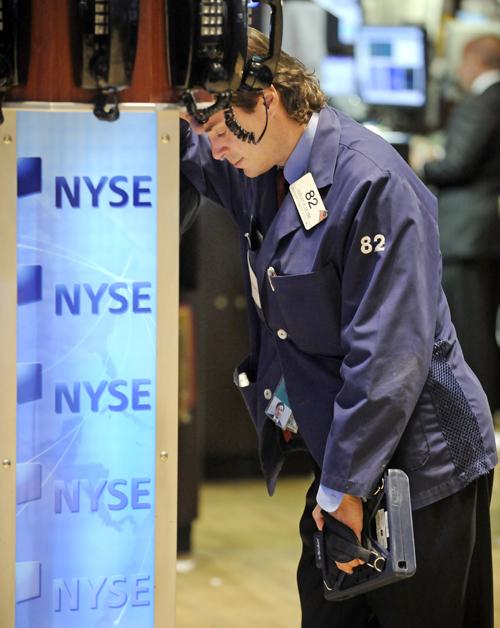Dow plunges after bailout takes effect
Trader Dudley Devine leans on a phone post on the New York Stock Exchange floor Monday. Wall Street suffered another traumatic session during the day. Richard Drew, The Associated Press
October 7, 2008
NEW YORK – Wall Street joined in a worldwide cascade of despair Monday over the financial crisis, driving the Dow Jones industrial average to their biggest loss ever during a trading day. Even a big afternoon rally failed to keep the Dow from its first close below 10,000 since 2004.
The sell-off came despite the $700 billion U.S. government bailout package, which was signed into law Friday after two weeks in which traders had appeared to count on the rescue as their only hope to avoid a market meltdown.
At its worst point, the Dow was down more than 800 points, an intraday record. The stock market rallied during the final 90 minutes of the trading day, and the Dow finished down about 370 points at 9,955.50.
Speculation among traders late in the session – that the market’s pullback had been severe enough to force the Federal Reserve into taking other steps to soothe the markets – helped stocks rebound from their lows of the session.
“If you can’t say that we’re oversold now I don’t know what you say. You’re at least due for a bounce if nothing else,” said Bill Stone, chief investment strategist for PNC Wealth Management.
Get The Daily Illini in your inbox!
The global plunge in stocks was under way well before Wall Street ever woke up. In Japan, the Nikkei average lost more than 4 percent. And then the losses spread across Europe – nearly 6 percent for the FTSE-100 in Britain, 7 percent for the German DAX and more than 9 percent for France’s CAC-40.
In the United States, President Bush twice made unscheduled remarks on the economy, saying in Cincinnati that the economy would be “just fine” but that the bailout package needed time to work.







